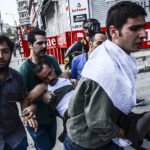
Turkey’s Rejuvenated Left
Turkey goes to the polls today for parliamentary elections. How has the struggle in Kobanê shaped the country's politics?

Turkey goes to the polls today for parliamentary elections. How has the struggle in Kobanê shaped the country's politics?

The ongoing attacks against Kurds in Turkey are part of a last-ditch effort by Erdoğan to hold onto power.

In a wide-ranging interview, the political economist Helen Thompson discusses how the fall of Bashar al-Assad in Syria has transformed the region. With an incoming Trump administration, the stage is now set for hawks to confront an isolated Iran.

Foreign intervention has only worsened the situation in Syria.

In Germany, that supposed bastion of liberal democracy, the state treats standing up for Kurdish rights as tantamount to terrorism — and hits activists with house searches, imprisonment, and even deportation.

Today's Turkish elections are occurring in a political environment transformed by the Gezi Uprising.

Bashar al-Assad has left the building. It took fourteen years of bloody conflict.

The elections in Turkey today will be a crucial test of the Left's ability to curtail Erdoğan's authoritarian rule.

Behind the humanitarian disaster of the Syrian civil war is a political crisis the Left urgently needs to understand.

In Germany, even radical left-wingers who long distrusted state power are today calling for more tanks and jets for Ukraine. Lacking alternative solutions to the conflict, parts of the Left increasingly fall in behind the government’s call to rearm.

Turkey is headed for snap elections — and Erdoğan's continued quest for dominance is again on the line.

The war in Gaza has split Kurdish opinion, marked by often strong hostility to Islamism as well as Zionism. But Kurds’ responses also draw on their experience of statelessness — and point toward a democratic order not based on rival nation-states.

Ilhan Omar is one of the most forthright critics of imperialism in US politics. That’s why her recent stances on Turkey, the Kurds, and the Armenian genocide are so disappointing.

Abdullah Öcalan, a founder of the Kurdistan Workers’ Party, made a surprise call in February for the PKK to lay down its arms. Whether there will be a just peace now depends on the willingness of Turkey’s political parties to support the new settlement.

Donald Trump claims he’s ending the “era of endless wars.” But over the course of his first term, he has come closer to starting new wars than ending the wars he inherited.

The election of a Green mayor in Budapest is a rare setback for Hungary’s far-right premier Viktor Orbán. But if it’s going to mount a sustainable challenge to his rule, the opposition needs to start voicing the malaise of the majority of Hungarians.

For over two decades, Kurdish leader Abdullah Öcalan has been held in the Turkish prison on İmralı Island. In this op-ed for Jacobin, he calls for a “democratic nation project” able to unite citizens of different ethnic backgrounds and cultural traditions.

Saudi Arabia’s war in Yemen relies on lucrative weapons deals with the West. But the arms shipments can’t happen if dockers refuse to load the ships — and in France and Italy, they’ve already taken strike action to stop the Saudi war machine.

Turkish president Erdoğan is wielding the state to attack anyone who won't capitulate to his authoritarian rule.

Led by the autocrat Recep Tayyip Erdoğan, Turkey’s government has responded to the coronavirus crisis as you would expect: with an iron fist. But the mainstream opposition isn’t proposing a democratic, egalitarian alternative. Workers will have to step in to fill the void.